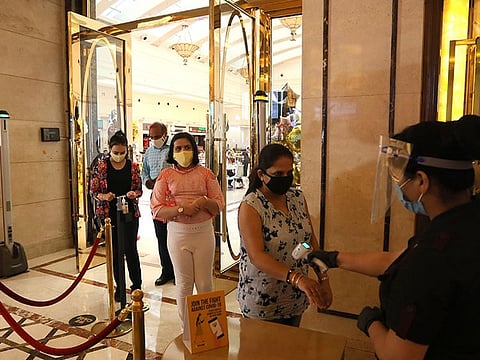India economy is turning the corner after COVID-19 hit, with growth making a return
An upturn is starting to show up much faster than many predicted

Mumbai: Concern about the depth of India's recession is slowly being replaced by optimism that a recovery is taking hold. A slew of indicators from car sales to services sector activity notched higher last month, while alternative data signal robust demand in an economy that's primarily driven by domestic consumption.
Data will likely show gross domestic product declined 8.2 per cent in the three months through September, according to economists surveyed by Bloomberg. While that pushes Asia's third-largest economy into its first technical recession in records going back to 1996, it's a sharp recovery from the record 24 per cent contraction the previous quarter.
All-round improvements
The improvements are expected to continue, with some analysts seeing the country returning to growth as soon as this quarter. The recovery from the lockdown has been stronger than expected, Reserve Bank of India Governor Shaktikanta Das said Thursday, signaling ahead of next week's rate decision that policymakers will keep their supportive stance.
"While the farm sector remained the bright spot, supported by a good monsoon season and subsidized inputs, we think the recovery likely spread wider across the economy and is on the verge of becoming entrenched," Rahul Bajoria, chief India economist at Barclays plc, wrote in a report to clients.
Capping the spread
That improvement coincides with a drop in India's daily virus cases, which have tapered off to half of its peak of more than 97,000 infections a day in mid-September.
"With cases rising elsewhere, India has fallen off the top in terms of fastest growing cases as well as deaths," said Bajoria, who sees positive growth this quarter and a full-year contraction at 6.4 per cent - milder than the RBI's forecast for a 9.5 per cent decline.
The RBI has been doing the heavy lifting on providing stimulus to the economy, having cut interest rates by 115 basis points so far this year, infused liquidity and transferred billions of rupees in dividend to the government. But its support has been stymied by inflation that's surged well above the central bank's 2-6 per cent target band.
For its part, the government expanded fiscal stimulus to 15 per cent of the economy, with most measures related to credit guarantee programmes.
We expect the recovery to moderate as inadequate fiscal stimulus, delayed monetary easing and fresh headwinds to exports counter strength in the rural economy and a boost from further lockdown relaxationAbhishek Gupta, India economist
Sign up for the Daily Briefing
Get the latest news and updates straight to your inbox






